Here are reviews of six classic horror films featuring two of the most iconic actors to ever appear in film--Boris Karloff and Bela Lugosi. These two men were gifts from God/Fate/Santa to cinema lovers, so I honor them on this day. Two of the selections feature both actors, while the remaining four consist of the two greatest films that each man made solo.
The Best of Boris Karloff & Bela Lugosi
The Black Cat (aka "The House of Doom" and "The Vanishing Body") (1934)
Starring: Bela Lugosi, David Manners, Boris Karloff and Jacqueline Wells
Director: Edgar G. Ulmer
Rating: Eight of Ten Stars
Honeymooners Peter and Joan Allison (Manners and Wells) are stranded in an isolated house in a Hungarian backwater. Here, they become drawn into the evil Satanist Hjaldmar Poelzig (Karloff) and the revenge-plans of his one-time friend Dr. Vitus Werdegast (Lugosi). As the story unfolds, the depth of Poelzig's evil and perversion is revealed in its fullest, and it seems there will be no escape for anyone.

"The Black Cat" is a stylish, incredibly creepy B-movie. It takes place almost entirely within a house built upon the site of a ruined WWI fortress, with the lower levels being the decaying remains of the original structure and the upper floors consisting of a sleek, ultra-modern home. Both sections of the structure lend to the tone of dread that permeates the entire film--with the well-lit, clean rooms of the upper levels of Poelzig's home being even creepier than that the shadow-haunted lower levels thanks to some fine camera work--although the revelation of Poelzig's "exhibit" of beautiful women below has got to be the most terrifying moment of the film. (In fact, I'm hard-pressed to think of a more evil and perverted character present anywhere in these classic horror films than Poelzig: Satanism, treachery, mass-murder, pedophelia... you name it, Poelzig's done it/is into it. (Karloff doesn't have a lot to do acting-wise, other than to just be sinister... but, boy, does he do that in spades here!)
Perhaps the most interesting aspect of this film is Lugosi. First, those who watch "The Black Cat" will get to see that he was, in fact, a great actor at one time. The pain Dr. Werdegast feels when he is told his wife and daughter died while he languished in a Russian prison is conveyed with incredible strength, as is the mixture of pain and rage when he later learns the truth about their fates, as he and the Allisons manage to seize the initiative from Poelzig and his cultists. Second, it's interesting to see Lugosi playing a hero for once, even if a deeply flawed hero.
On a quirky note, I often complain that horror movies from 30s through the 60s and early 70s often just end: The story resolves and the credits roll without providing the audience with the nicety of a denoument. "The Black Cat" DOES provide what I wish more films would, yet here I almost wish that last minute or so hadn't been included. This is a film that probably should have ended while still in darkness.
While "The Black Cat" has absolutely nothing to do with the Poe tale that "suggested" it--it's got more in common with "The Fall of the House of Usher", I'd say--I think it represents a high point of the horror films that Universal was making in the 30s. I don't see it mentioned often, and I think it's a shame. It's a film that's worth seeing.
The Body Snatcher (1945)
Starring: Boris Karloff, Henry Daniell, Russell Wade, Bela Lugosi and Edith Atwater
Director: Robert Wise
Rating: Nine of Ten Stars
In this loose adaptation of a Robert Louis Stevenson short story, a young medical student (Russell Wade) becomes drawn into the twisted relationship between a brilliant but coldhearted surgeon (Henry Daniell) and a strange coachman who moonlights as a body snatcher to provide the doctor with research specimens (Boris Karloff).

"The Body Snatcher" is a one-stop spot to discover why producer Val Lewton, actor Boris Karloff and director Robert Wise are held in such high regard by horror movie fans and filmmakers.
Lewton's touch is all over this film, and there is barely a scene that doesn't feature terror technqiues that filmmakers copy and rely on to this very day. Karloff gives one of the very best performances of his career, oozing greasy charm and quiet menace with every word and gesture. And then there's the very chilling scene where he's just choked a man to death, is sitting over the corpse, and then reaches out to stroke his pet cat. And, finally, Wise mounts a brilliantly structured film where the mystery and tension keeps mounting until the end, and every scene is perfectly paced, framed and lit. Much gets said about film noir, but the use of light and shadow in black and white horror films like this one is far more important that in crime dramas, and Wise here Wise uses the medium to perfection.
And, of course, the stars are backed up by an excellent supporting cast, including Bela Lugosi in his final horror role for a major studio. Lugosi's role is small, but he brings a level of raw creepiness to his character, creepiness born more of stupidity than the evil that wafts from Karloff's character.
In retrospect, the fact that Lugosi dies in a very key scene in the film is something of an allegory for his career, as well as Karloff's. In the scene in question, Lugosi ends up dead on the floor and Karloff reaches out to pet a cat in a very creepy moment. This was the second-to-last film Lugosi made for a major studio, and his career and life were mostly a downward spiral from here, while Karloff's career in horror films continued to flourish.
The Best of Bela Lugosi
The Devil Bat (aka "Killer Bats") (1942)
Starring: Bela Lugosi, Dave O'Brien, and Donald Kerr
Director: Jean Yarborough
Rating: Seven of Ten Stars
Everyone loves the ever-smiling chemist Dr. Paul Carruthers (Lugosi), especially the investors in the cosmetics company he's been creating best-selling colognes and perfumes for. When the company owners make what they feel is a nice gesture to reward Carruthers' many years of service, he feels like he's been insulted and he decides to kill his bosses and their entire family. Revealing that he's as talented a mad scientist as he is a chemist, Carruthers transforms otherwise harmless bats into giant hunter-killers that hone in on a special cologne that he's given to his victims for "testing." Will Carruthers get away with his bloody schemes, or will a lazy tabloid reporter (O'Brien) and his photographer (Kerr) manage to stumble their way to the truth?
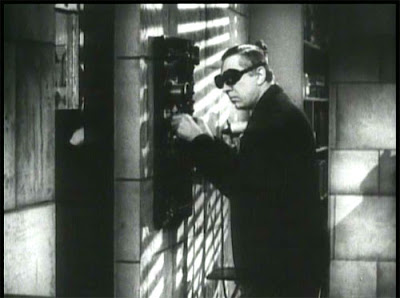
That's a long summary, but "The Devil Bat" is pretty convoluted. In fact, it's so convoluted that it's one of those films that you need to just watch without thinking too hard, particularly when it comes to Paul Carruthers, his killer bats, and his rambler house with its secret Mad Scientiest Lab and tower for convenient bat launches.
The film's got a decent cast (with Lugosi being particularly fun to watch) a story with plenty of humor (both intentional and unintentional), and a pace that is just fast enough to keep the viewers interested. It's by no means a masterpiece, and its low, low budget is painfully visible in some of the sets (although the bat effects are better than I expected), but it's a fun bit of viewing if you enjoy Bela Lugosi and the nonsense breed of plup fiction-style sci-fi/horror flicks that filled the B-feature slots at movie houses in the 30s and 40s.
By the way, I highly recommend getting the DVD version of the film that I've linked to below. Not because I recommend watching colorized classics, but because I think it's fascinating to compare a colorized version with the black-and-white version. Invariably, you will discover that colorizing saps a film of life rather than enhances it. (I used to think that it was only dramas that were ruined by colorization. Then I picked up the disc containing both the colorized version and original version of "My Man Godfrey." Actually, watching both versions close together changed my mind completely.)
White Zombie (1932)
Starring: Bela Lugosi, Madge Bellamy, Robert Frazer, John Harron, and Joseph Cawthorn
Director: Victor Halperin
Rating: Nine of Ten Stars
When Haitian plantation owner Charles Beaumont (Frazer) becomes obsessed with the beautiful Madeleine (Bellamy), he invites her and her husband-to-be (Harron) to have their marriage and spend their honeymoon at his plantation. When he fails to win Madeleine's heart, he turns to his neighbor, 'Murder' Legendre (Lugosi) and asks him to use his powers to create zombies to recreate Madeleine as his love slave. Will Madeleine's fiance and the local priest (Cawthorn) unmask Legendre's evil and save Madeleine from a fate worse than death, or will they merely become yet another pair of zombies in Legendre's growing force of mindless slaves?
"White Zombie" has been described as the first zombie movie ever made. I don't know if this is true or not, but it is definately one of the best. It predates the flesh-eating blood-spattered cannibal zombies of George Romero, but instead relies upon traditional zombie myths and tales of dark sorcery to generate its chills.
This is a stylishly filmed movie that features creepy performances by Lugosi and Bellamy, and scenes that drip with creepiness, as Legendre's mindless slaves work his sugar mills, and as a ghostly, zombie-fied Madeleine glides silently through the vaulted halls of Legendre' house. (The height of creepiness is reached when the depth of Legendre's evil is fully revealed and he gradually starts turning Charles Beaumont into a zombie as well.)
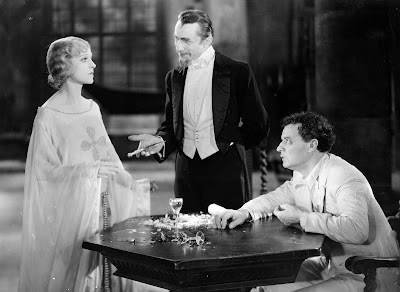
"White Zombie" is a must-see for fans of classic horror movies in general, and fans of zombie movies in particular. It is the one of the roots from which the horror genre sprang. Heck, the film should be required viewing for anyone who is currently making horror movies... if filmmakers chose to emulate a work like this, maybe we'd have more decent horror movies coming out.
The Best of Boris Karloff
Bedlam (1947)
Starring: Boris Karloff, Anna Lee, Billy House, Richard Fraser, Ian Wolfe and Leyland Hodgson
Director: Mark Robson
Rating: Nine of Ten Stars
When Nell Bowen (Lee), an actress turned live-in companion and jester for one of London's leading citizens (House) makes it a personal crusade to improve conditions at the Bedlam institution for the insane, she makes a personal enemy of its Apothecary General, Master Sims. She soon discovers that those who Sims feels threatened by end up as inmates at Bedlam, whether they are insane or not.
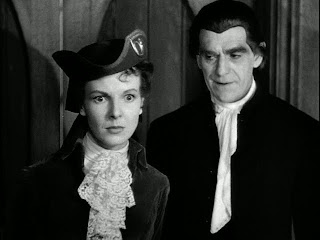
In "Bedlam," we see Boris Karloff playing the most despicable and evil character he ever portrayed during his career. Master George Sims is a self-centered little man who has achieved some small degree of social standing through toadying and by abusing his position by turning the government-operated asylum and its inmates into a sideshow attraction, complete with admission fees. Although he talks about compassion, it is clear that he has has none, both from his attitude and deeds. Everything within the walls of his asylum are there to boost his fragile ego, and anyone who threatens it from the outside, he brings under his control by having them committed by a board of governors that he has under his sway.
If played by a lesser actor, Master Sims would probably have been a boring character consisting of pure evil covered by a thin veneer of hypocrisy and oily charm. However, Karloff manages to infuse humanity into this monstrous figure, giving Sims a dimension that makes him just sympathetic enough that viewers can appreciate where he's coming from even while recognizing that he is an absolute villain.
One of the key moments for Sims' is when he falls into the hands of the inmates and they put him on trial to determine if insanity drove him to commit all the cruel acts he is responsible for. Without ruining the film, I can say that Sims gives a speech that convinces the inmates that he is indeed sane, because his actions were driven by a hunger for recognition from his betters and a sad hope to be accepted as their equal. But, although Sims seems to be soul-searching and understanding that his behavior is misguided and wrong, it quickly becomes apparent that he will fall back into his old ways, because the only way for him to overcome what is ultimately an unsurmountable degree of self-loathing is for Sims to feel himself bathed in what he considers the reflected light from his "betters."
And it is this reflected light that starts the conflict between Master Sims and Nell Bowen. She not only shows Sims up in front of one of the nobles whose approval he so desperately wants, but she shows herself to be more favored than he when she isn't punished for displaying repeated and open contempt for him. Worse, Bowen doesn't need the approval that Sims devotes his entire life to gaining, so he has no real weapons to weild against her except his ability to force her into his charge and break her spirit and mind.
It is plain to viewers early on that Nell will ultimately end up at Sims mercy, because she refuses to back down, and as the film unfolds, much of the suspense comes from the fact that there seems to be no way out for Nell and that her strong spirit will get her killed. The confrontations between Sims and Nell, which never rise above verbal sparring, are really the heart of the film... and they are scenes that would not work half as well if it wasn't because the lines are being delivered by two great actors whose performances are bringing dimensions to the characters far beyond what would usually be expected from a low-budget drama.
These great performances also lift the film to the point where you're not quite sure what's going to happen... and not just because Val Lewton has delivered films with genuinely suprising endings before (is there anyone who can honestly say they saw the ending of "Cat People" or "I Walked With a Zombie" coming before it hit?), but because the characters have a degree of life to them that doesn't let us assume that the script will follow the pat ending where the heroine is rescued and the dastardly villain gets his just rewards. (And, to some degree, Lewton once again delivers a powerful and unexpected ending, perhaps the creepiest of any of his RKO films.)
Of course, I also need to give some credit to Mark Robson, the film's director. He was an editor at RKO whom Lewton wanted to give a chance to direct, and for whom Lewton passed up the opportunity to work on films with bigger budgets.
After his early hits, RKO execs wanted to give Lewton more money to work with, but it meant that Robson would not have a chance to direct. Lewton chose to stay with the smaller budgets and the B-pictures, showing personal character and a degree of loyalty to his fellow creators that one wishes more people possessed.
And Lewton's faith in Robson was obviously well-placed. While most of Lewton's RKO pictures are lean efforts without a second of filler to be found, "Bedlam" is even tighter than the rest. There is not a single scene that doesn't start or end at just the right moment, and there is not a single shot that isn't perfectly timed or lit.
With the excellent performances from its stars, able assistance from a talented supporting cast, and great direction, camera-work and editing, "Bedlam" is a fine thriller that fans of classic movies should seek out.
"Cat People," "I Walked With a Zombie" and "The 7th Victim" may get most of the commentaries when it comes to Lewton films, while "The Mummy," "Frankenstein" and "Targets" get the accolades in the Karloff canon, but "Bedlam" is a film that deserves more attention from fans and reviewers alike.
The Mummy (1932)
Starring: Boris Karloff, Zita Johann, David Manners, and Edward Van Sloan
Director: Karl Freund
Rating: Eight of Ten Stars
After an archeologist accidentally restores him to life, a cursed ancient Egyptian high priest Imhotep (Karloff) sets about likewise reviving Princess Anckesen-Amon for whom he gave up everything so they can resume their forbidden love. Unfortunately, she has been reincarnated, and her spirit is currently residing within Helen Grosvenor (Johann), the daughter of a British diplomat. Imhotep hasn't let the natural order of things stop him in the past, and he's not about to let it get in his way now.
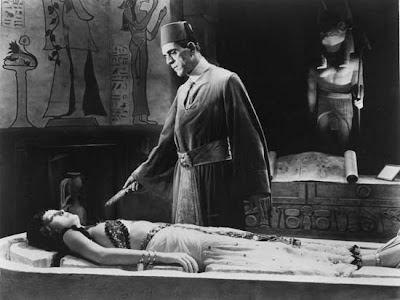
"The Mummy" is perhaps the best, most intelligent mummy movie ever made. It's more of a gothic romance story set in Egyptian surroundings than a monster movie, with Imphotep trying to recapture a love that he lost 3,700 years ago.
The actors in this film are all perfectly cast, and they are all at the top of their game.
Karloff is spectacular, conveying evil, alieness, majesty, and even a little bit of tragedy in his character with a minimum of movement. (Unlike most mummy movies, Imhotep isn't a bandage-wrapped, shambling creature, but instead appears like a normal human being; he is still dried-out and somewhat fragile physically, though, and Karloff does a fantastic job at conveying this.)
Johann likewise gives a spectacular performance, particularly toward the end of the movie as Imhotep is preparing to make her his eternal bride and she has regained much of her memories from when she Anckesen-Amon. Johann is also just great to look at.
The two remaining stars, Manners and Van Sloan, are better here than anything else I've seen them in. Manners in particular gives a fine performance, rising well above the usual milquetoast, Generic Handsome Hero he usually seems to be. (Even in "Dracula" he comes across as dull. Not so here.)
The cinematography is excellent and the lighting is masterfully done in each scene. Karloff's character is twice as spooky in several scenes due to some almost subliminal effects caused by lighting changes from a medium shot of Manners to a close-up of Karloff... and the scene where Imhotep is going to forcibly turn Helen Grosvener into an undead like himself is made even more dramatic by the shadows playing on the wall behind the two characters.
There are some parts of the film that are muddled, partly due to scenes that were cut from the final release verson, or never filmed. Worst of these is when Imhotep is interrupted during his first attempt at reviving Anckesen-Amon, and he kills a security guard with magic during his escape. However, he leaves behind the spell scroll that he needs for the ritual. Why did he do that? It's a jarring, nonsensical part of the movie that seems to serve no purpose other than to bring Imhotep into direct confrontation with the heroes. (The commentary track on the version of "The Mummy" featured in Universal's "The Mummy Legacy Collection" sheds light on what the INTENTION was with that development, but it just seems sloppy and badly conceived when watching the movie.)
While "The Mummy" may seem a bit slow to people who are used to Brandon Fraser dodging monsters--or even the Hammer mummy movies--it is a film that every cinema buff should see and even add to their personal movie collection.








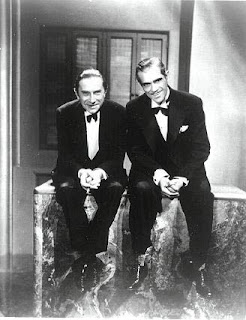






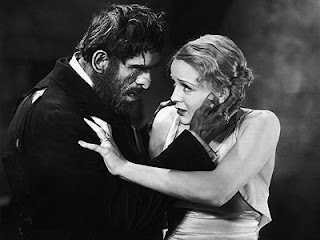



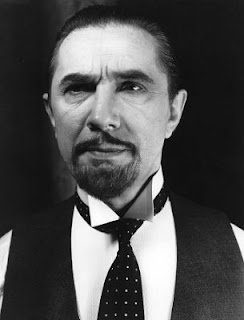




























.jpg)
